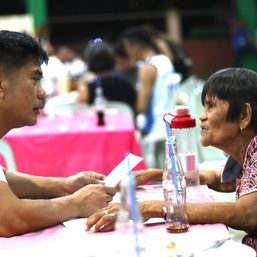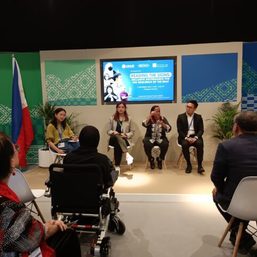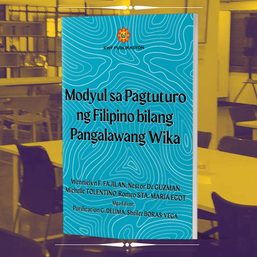SUMMARY
This is AI generated summarization, which may have errors. For context, always refer to the full article.
![[OPINION] The Month of Language: (British) English only, please](https://www.rappler.com/tachyon/2023/08/ispeak-english-is-filipino-too.jpg)
Something that became real to me recently is the idea that if you know a language to a degree that it’s part of who you are, then you own that language as much as anyone else who knows it does – even people of the country where that language came from.
This matters because, as Filipinos, we’ve always had a thorny relationship with language. We size one another up according to the way we talk – which language we use and with what accent or puntó. Our choice of Tagalog as the basis of our Filipino national language has been questioned by users of our country’s other languages, and while the reasons for that choice were pragmatic, they did entail political ramifications. Here in the Philippines (as it probably is in most other countries), language is a political tool and a status symbol.
The realization hit me while I was working remotely from Manila for an international publication in English under British – English, to be specific – bosses. You see where I am going.
As a rule in that publication, staffers had the option of writing in either American English or British English, as long as they kept to a single style within each article. That meant not writing “realize” in one sentence and then “actualise” in another, or “offense” in one and then “defence” in another. We could choose our style; we just had to be consistent.
The option was new to me because most other international (and even some local) publications I previously worked for used one of either style and forbade the other. I appreciated the inclusivity, and as a true postcolonial child of the Philippines, I chose to write in the American style because it came more naturally to me. For instance, I call the metal used in aircraft “aluminum,” not “aluminium.”
The trouble began when I was put in charge of TikTok and IG Reels – collectively termed “vertical video” or simply “verticals” – for our Asia-Pacific unit. My British bosses at the company’s London office insisted that the subtitles on all verticals be in the Queen’s (now the King’s) English. I didn’t understand why the style option didn’t apply here, but being new on the job, I felt it wasn’t my place to question it, or at least not yet.
In the daily rush of the news cycle, it sometimes slipped my mind to Anglicize (Anglicise) the scripts (which were the bases of subtitles) submitted to me by the Asia reporters, half of whom also wrote in American English. There were a zillion moving parts to each vertical that needed vetting and quality control so, to my mind, whether the subs were in the British or American style mattered little in the big picture. Thus, there were times when we’d finish and submit a vertical to London, only to have London return it to us because a subtitle said “center” instead of “centre,” or we didn’t use Oxford commas.
And it’s not as if I didn’t check every piece before passing it on to London. I did, but I sometimes overlooked these style “errors” because they didn’t look wrong to my eye. (Yes, I know there’s autocorrect for that, but American spellings sometimes still made it to the cut.)
Here’s the rub: because Manila is seven hours ahead of London (eight when it’s DST), this last-minute back-and-forth tended to happen close to my and my kabayan video editor’s midnight. Of course, subtitle “errors” weren’t the only thing our British colleagues were watching for, but there were a few times when our verticals were held back just because it said, for example, “labor” instead of “labour.”
We could either argue it out with our British colleagues and prolong our agony, or just get it over with, log off, and go to bed. We choose our battles, don’t we? Besides, it seemed our British colleagues were adamant about using their style of English because they often punctuated their style “corrections” with the Union Jack emoji. I can take a hint.
Civil disobedience wasn’t an option, because without London’s sign-off, our verticals wouldn’t go live, and then I’d have to explain to the rest of the Asia team in the morning why they weren’t seeing their work on the platforms. I tried to push back by asking whether it was really necessary to stall a vertical over “minor” details. London responded with a pledge to revert with corrections sooner to spare Manila the late nights. Clearly, I failed to build my case.
That it was the London folks who had the final say on the Asia team’s work was itself an issue (the Asia team did challenge this), but the imposition of the Anglican style on subtitles hit a raw nerve with me. It wasn’t just because it led to more work – I succeeded in training myself to Anglicize (Anglicise) everything anyway. The slight was personal. It involved feelings.
I felt hurt. I felt belittled. In wokespeak, I felt “othered.” To me, it was as if our British colleagues were saying that the English I spoke and wrote in was inferior to theirs. That it wouldn’t do, it wasn’t valid, and it had to be rectified, even if my video editor and I had to lose sleep doing so.
I bit my tongue because I thought I might have been overreacting. It took me a while to snap out of gaslighting myself and acknowledge that my resentment was a symptom of something real.
I thought about raising the precise issue with the bosses – that it wasn’t the workflow but the imposition of the Queen’s English that I had a problem with. But I didn’t know where to start, so I procrastinated (and never got around to it). Because – how do you make these Westerners understand where you’re coming from without losing your composure or appearing dramatic?
They’ve never felt second class. Never had to learn a second language in order to participate in the world. Never been shamed on account of their use of an acquired language. Never been embarrassed for mispronouncing words or making errors in grammar or faltering when they translate thoughts into speech. Plus, they’re your bosses.
How do you then make them comprehend that the rule that might seem trivial to them is triggering 500 years of colonial trauma in you, so if they could please just be cool about it? Could you tell colleagues you’ve only met online that you have a personal issue with their policy, and then expect them to still regard you professionally? Would they even give you the time?
Bottom line – they don’t have the inferiority complex of people who descended from slaves, which, I must admit, played into my reluctance to confront the issue.
Because the issue wasn’t really about how we spelled words, right? It was about power. It was the ghost of colonialism inhabiting new flesh – the fact that I, from the developing world, was working for a company based in the developed world, telling stories about the global South through a decidedly Western lens, notwithstanding our touted efforts to “decolonize (decolonise)” our coverage. It echoed with everything that was unfair in the history of the world, funneled (funnelled) into this little scenario where people with no heritage of subservience or subjugation inadvertently flexed their privilege and asserted dominance through the politics of a language they seemed to think they were the masters of (insert Union Jack emoji).
I suddenly gained a visceral understanding of why our ancestors, despite being woefully outclassed in arms and provisions, waged war with the Spaniards, the Americans, the Japanese. I was surprised that it caused me such pain, but it was real. I felt it in my innards.
So there I was, in the throes of my rancor (rancour? Shut it!), when it dawned on me: I, a Filipino, own the English language, too. It is mine. It is my language, as is Tagalog. I have my own history and relationship with it, just as the Philippines has its own history and relationship with it. No one, not even the English, should be able to impose their way of writing or speaking it on me just because.
For a long time I subconsciously believed that my embrace of English was elitist and a betrayal of my Filipino identity. That I was a phony for making a career out of writing in English. That’s what I directly or indirectly picked up from many teachers and pundits and self-proclaimed patriots anyway.
But in this situation, was I taking the fall for American English per se? Was it for America or Americans that I felt hurt? No. I felt hurt for myself. For Filipinos. It wasn’t only American English the British bosses were sidelining – it was also the English that found its way to the Philippines, that baptized Filipinos into all the cultures and literatures that swim in its ocean, that initiated us into its tradition as the vernacular of the globalized world. It’s the language that has enabled Filipinos to live and thrive and make friends in every part of the world.
For better or worse, the English language is integral to my experience of life as a Filipino. It is a language I hear and read and speak and write in as regularly as I do Tagalog. So when someone comes along implying that their English is more important or more valid than mine, I feel it as an affront to Filipinos in general, who have an entire culture and literature – names, conversations, novels, newspapers, magazines, books, films, plays, shows, songs, poems, laws, every single official document, billboards, street signs, letters, web pages, social posts, chat messages, text messages, emails, spam, product labels, food wrappers, every other scrap of garbage – an entire existence encoded in this language.
And because the incident happened in a virtual newsroom where we supposedly advocated justice and world peace, I felt hurt for all of us in the Third World who’ve been treated like second-rate humans even on our own soil, and who’ve had to prove ourselves, as no person from the First World has ever had to, by making sense of the vestiges of our colonization – cultures, worldviews, sensibilities, literatures, languages – and working out how they figure in our identity. And our triumph is in coming to own and use them to expand our footprint beyond our colonially-defined borders.
I think we Filipinos are fortunate that Tagalog and Cebuano and Waray and Ilokano and Ilonggo and all our other native languages survived all those centuries of colonization, because through them we have retained something of our primordial identities. I also think we are fortunate that we’ve acquired English, because it lessens our isolation from the rest of the world. Besides, knowing more languages is always a plus, never a minus.
And so the paradox here is that our colonial experience has made most of us Filipinos multilingual, which then affords us a certain power not every nation can claim to have.
To illustrate: my video editor and I always spoke in Tagalog on our own chat thread, separate from the group channel where everyone else needed us to speak in English. One evening, he and I went on and on in Tagalog without realizing we were chatting on the group channel. When we came to, we deleted everything and apologized for the mistake.
Just then, one of the British bosses (now ex-bosses), messaged me on our separate thread.
“You must’ve been talking trash about me,” he said teasingly.
“Naw, why would we?” I replied, my palms a bit sweaty.
“It makes me jealous that you speak more than one language,” he continued. “It’s like having a whole other world. I only know English.”
I was of course compassionate in my response, but I felt a wicked sense of satisfaction from what he said. I was glad he couldn’t see me smirking. I wanted to insert the Philippine flag emoji. – Rappler.com
Add a comment
How does this make you feel?
![[OPINION] The guilt of being born and raised Filipino, but having English as your first language](https://www.rappler.com/tachyon/2020/08/english-first-language-august-18-2020.jpg?fit=449%2C449)





There are no comments yet. Add your comment to start the conversation.